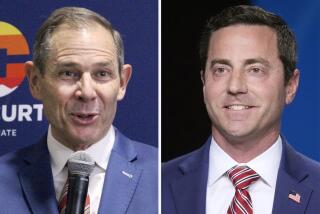In Iowa, trouble in the wind for Mitt Romney
- Share via
DES MOINES — It’s an overriding conservative principle: Scale back government interference and let businesses survive or fail on their merits.
But standing by that principle may hurt Mitt Romney in Iowa, a hotly contested swing state that could provide a crucial six electoral college votes in November.
Romney recently upset many conservatives here by saying he would end a government tax credit that helps subsidize a burgeoning wind industry in the state. Some of them — farmers who earn tens of thousands of dollars a year for having wind turbines on their property — say they won’t vote for Romney because of his wind position. Others, including Rob Hach, a lifelong Republican who owns a wind-energy business, even say they’ll now vote for President Obama.
“It’s critical for the economy,” said Hach, whose company, Anemometry, moved into a shuttered furniture store in rural Alta and then expanded to an abandoned lumberyard. “Right now, the Midwest is experiencing an intense drought, and the wind turbines are producing revenue for farmers, while the crops are not.”
It is not just rural voters in Iowa who are invested in wind. Throughout the Midwest, wind turbines are popping up in areas once sustained by agriculture or manufacturing. The industry has created 7,000 jobs in Iowa, opening manufacturing plants in towns where Maytag factories once operated. Wind creates 5,000 direct and indirect jobs in Ohio, the fastest-growing state for new wind-power installations last year, and 1,000 jobs in Indiana, according to the American Wind Energy Assn., a trade group.
Conservatives such as Hach say they don’t want handouts. But in the heartland, where the population has declined as younger generations have moved to the cities, the idea of an industry that could resuscitate struggling small towns is an exciting one. Wind advocates say they just need a few more years of government help to get the industry on its feet.
“Iowa is known for brain drain, when talented farm kids leave the state,” Hach said. “But wind turbines could help bring them back.”
Many Republicans in Congress support tax credits for renewable energy, including Iowa Sen. Charles E. Grassley, South Dakota Sen. John Thune and Iowa Rep. Tom Latham, who introduced Romney at an event Wednesday in Des Moines (though when a Latham aide was asked about the tax credits before the event, she covered her ears with her hands, said, “I can’t hear you,” and walked away).
More than 81% of all wind capacity installed in the United States is in congressional districts represented by Republicans, according to the U.S. Wind Industry Annual Market Report.
“Romney’s position on wind energy and generally his opposition to government subsidies and tax benefits will be a huge problem for him in Iowa come November,” said Steffen Schmidt, a political science professor at Iowa State University. “Iowa’s wind industry, from production to wind farms … requires a partnership with government. Without that the ethanol plants will go dark, farmers will go bankrupt, and the wind industry will go silent.”
At issue is a production tax credit, set to expire this year, that allows wind farms to receive a credit of 2.2 cents per kilowatt-hour of electricity they produce. It has not been allowed to expire since its extension in 2005, but last week, a Romney spokesman told the Des Moines Register that Romney “will allow the wind credit to expire, end the stimulus boondoggles and create a level playing field on which all sources of energy can compete on their merits.”
The comment irked Iowa’s Republican Gov. Terry Branstad and many in the state’s Republican congressional delegation. Branstad called Romney’s staffers a “bunch of East Coast people that need to get out here in the real world to find out what’s really going on,” in an interview with Radio Iowa last week.
He slightly tempered his criticisms this week.
“I can understand why he objects to Solyndra and all the boondoggles Obama has supported with the stimulus, but remember, the wind energy tax credit [was proposed] by Sen. Grassley and way preceded Obama,” Branstad said in an interview. “It’s a tool that’s helped us grow this energy.... We love it.”
Still, for many voters, the economy and the national debt will trump any concerns about tax credits for wind. Many came out Wednesday to support Romney in Des Moines, where he repeated his charge that Obama was seeking to water down federal work requirements for welfare recipients, and outlined a five-point plan to help the middle class. (He did not mention wind energy.)
Chris Bobst, 53, who owns a drywall and plaster business near Des Moines, says Romney’s position on wind doesn’t matter to him.
“I think they should eliminate all tax credits. I own a small business. When it isn’t working out, no one bails me out,” said Bobst, who supported Rick Santorum during the caucuses because of his conservative Christian values, and is now supporting Romney because he is concerned with federal spending, debt and deficit under Obama. “I just feel we can’t have four more years of Obama.”
But even if it isn’t a top issue for all voters, wind may help sway votes in a swing state — a prime reason Obama will campaign in a three-day bus tour here beginning Monday.
The wind tax credits are especially popular now that a drought has gripped much of the state. For many farmers, turbines are providing a steady income while crops are not.
Tim Hemphill, for example, earns $20,000 a year from two turbines on his corn and soybean farm in Milford.
“Romney wants to end those tax credits, and if he does, there probably will not be many wind turbines built in the nation,” he said.
More than half of Iowa voters say they would be less likely to vote for a presidential candidate who did not support expanding wind power, according to a poll conducted by Public Opinion Strategies and sponsored by the American Wind Energy Assn.
“This is something that could turn people away from backing Mitt Romney in a state that is really competitive,” said Craig Robinson, editor of the Iowa Republican, a website about conservative politics in the state. “People reason if you’re against wind, you’re probably against a lot of other ag subsidies — and you don’t want to tick off the Republican ag vote, because that’s where Romney really needs to make hay.”
Semuels reported from Alta, Mehta from Des Moines.
More to Read
Inside the business of entertainment
The Wide Shot brings you news, analysis and insights on everything from streaming wars to production — and what it all means for the future.
You may occasionally receive promotional content from the Los Angeles Times.












